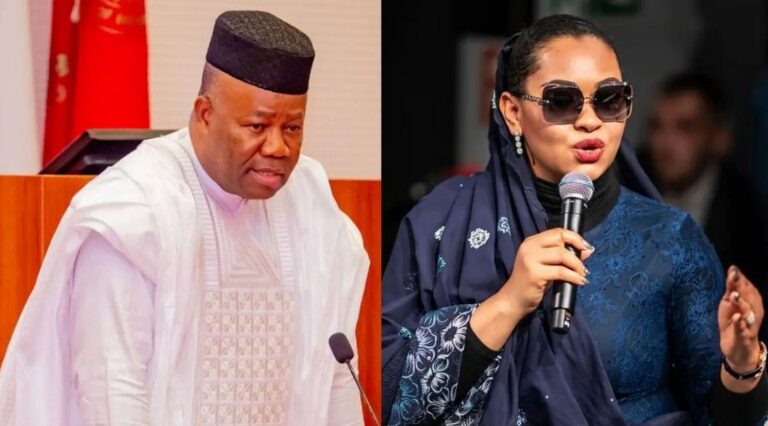Natasha refuses to drop case against Akpabio

Senator Natasha Akpoti-Uduaghan, representing Kogi Central, has vowed to aggressively pursue a sexual harassment lawsuit against Senate President Godswill Akpabio.
This follows an exchange of letters between her and Akpabio’s lawyer, Olisa Agbakoba (SAN).
In her April 30, 2025 response, Akpoti-Uduaghan insisted her claims are factual and reserved further details for court.

She criticized Agbakoba for demanding evidence outside official court filings, stressing that such requests misrepresent international sexual harassment standards.
Additionally, she condemned Akpabio’s media strategy, arguing it undermines judicial fairness.
The Senator emphasized that legal disputes should be resolved in court, not through public pressure.
Akpoti-Uduaghan clarified that past polite interactions with Akpabio do not invalidate her allegations.
She noted that civil behavior in public settings should not excuse misconduct.
Furthermore, she revealed she never received earlier letters from Agbakoba and highlighted two ongoing lawsuits.
One case, filed by Akpabio’s wife, Unoma, seeks ₦250 billion for defamation and harassment.
The other, initiated by Akpoti-Uduaghan, contests her Senate suspension and ethics committee referral.
Agbakoba had demanded a retraction, citing inconsistencies in her timeline, including her social media praise for Akpabio post-alleged incident.
As both cases advance, Akpoti-Uduaghan remains silent on legal advice, upholding judicial integrity.
This high-profile clash raises critical concerns about sexual harassment in politics and its impact on governance.
The outcome could set a precedent for accountability among public officials, reinforcing the need for impartial legal processes.
The dispute also highlights the tension between legal and media battles, as Akpoti-Uduaghan insists on courtroom resolution.
Her stance underscores the importance of due process in addressing sensitive allegations. Meanwhile, Akpabio’s legal team continues to challenge her claims, framing them as unsubstantiated.
Observers await the court’s decision, which will shape public trust in Nigeria’s judicial and political systems. The case has already sparked debates on power dynamics and gender equality in governance. Regardless of the verdict, its repercussions will likely influence future harassment allegations in leadership circles.
Akpoti-Uduaghan’s determination reflects broader advocacy for victims’ rights, while Akpabio’s defense tests the limits of legal counterclaims. The proceedings will scrutinize evidence, timelines, and legal interpretations, setting a crucial benchmark for similar cases. Ultimately, this legal battle underscores the delicate balance between reputation management and justice.
The Senator’s refusal to engage in media trials reinforces her commitment to procedural fairness. Conversely, Akpabio’s approach highlights the challenges of defending against such allegations in the public eye. As the case unfolds, its implications for Nigeria’s political and legal landscape remain significant, with potential long-term consequences for accountability and transparency.
Both parties remain steadfast, ensuring a closely watched courtroom showdown. The resolution will not only determine their fates but also signal how Nigeria’s institutions handle high-stakes harassment claims. For now, the focus remains on the judiciary’s ability to deliver an impartial verdict amid intense scrutiny.
Post Views: 84





